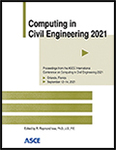Evaluating Computational Methodologies for Grading Buildings on Energy Performance Using Machine Learning Techniques
Publication: Computing in Civil Engineering 2021
ABSTRACT
Buildings are the largest user of energy in the United States and account for more than 50% of carbon emissions in large cities. Adopting effective tools for encouraging more energy-efficient buildings is therefore paramount. Cities in the US widely use the EnergyStar score for grading the energy efficiency of the buildings. The EnergyStar score uses multiple linear regression (MLR) model to assign a 1–100 score to each building, and its accuracy has been questioned recently by experts. This study evaluates the EnergyStar grading methodology and compares it with more complex machine learning based methods. The work focuses on two major aspects of the grading: (1) model accuracy and (2) building attributes used in modeling. The results show that the two developed machine learning models, random forest and extreme gradient boosting, outperform the linear EnergyStar model. Therefore, considering the significant impact of grading labels on energy improvement actions, implementing more accurate grading methods is suggested.
Get full access to this article
View all available purchase options and get full access to this chapter.
REFERENCES
Abbasabadi, N., Ashayeri, M., Azari, R., Stephens, B., and Heidarinejad, M. (2019). “An integrated data-driven framework for urban energy use modeling (UEUM).” Appl. Energy, 253, 113550.
AlizadehKharazi, B., Alvanchi, A., and Taghaddos, H. (2020). “A novel building information modeling-based method for improving cost and energy performance of the building envelope.” Int. J. Eng. 33(11), 2162–2173.
Arjunan, P., Poolla, K., and Miller, C. (2020). “EnergyStar++: Towards more accurate and explanatory building energy benchmarking.” Appl. Energy, 276, 115413.
Chen, T., and Guestrin, C. (2016). “Xgboost: A scalable tree boosting system.” Proceedings of the 22nd Acm Sigkdd International Conference on Knowledge Discovery and Data Mining, San Francisco, CA, 785–794.
Chicago Data Portal. (2018). Chicago Energy Benchmarking - 2017 Data Reported in 2018. <https://data.cityofchicago.org/Environment-Sustainable-Development/Chicago-Energy-Benchmarking-2017-Data-Reported-in-/j2ev-2azp>(Apr. 10, 2021).
D.C. Government. (2018). Greenhouse Gas Inventories. Department of Energy and Environment. <https://doee.dc.gov/node/18822>(Apr. 10, 2021).
Drexel University. (2016). Options for Achieving Deep Reductions in Carbon Emissions in Philadelphia by 2050. <https://www.phila.gov/media/20160502170712/Emissions-Reduction-Report-80-by-50_Jan-2016.pdf>(Apr. 10, 2021).
EIA. (2015). Commercial Buildings Energy Consumption Survey (CBECS). U.S. Energy Information Administration. <https://www.eia.gov/consumption/commercial/reports/2012/methodology/conducted.php>(Apr. 10, 2021).
Energy Star. (2014). How the 1-100 ENERGY STAR Score is Calculated. <https://www.energystar.gov/buildings/benchmark/understand_metrics/how_score_calculated>(Apr. 10, 2021).
Erfani, A., Tavakolan, M., Mashhadi, A. H., and Mohammadi, P. (2021). “Heterogeneous or homogeneous? A modified decision-making approach in renewable energy investment projects.” AIMS Energy, 9(3), 558–580.
Fannie Mae. (2014). Fannie Mae - Energy and Water Use Survey Database. Federal National Mortgage Association. <https://multifamily.fanniemae.com/media/document/xlsx/fannie-mae-energy-and-water-survey-database>(Apr. 10, 2021).
Gao, X., and Malkawi, A. (2014). “A new methodology for building energy performance benchmarking: An approach based on intelligent clustering algorithm.” Energy and Build. 84, 607–616.
Heidari, H., Warziniack, T., Brown, T. C., and Arabi, M. (2021). “Impacts of climate change on hydroclimatic conditions of US national forests and grasslands.” Forests, 12(2), 139.
Kapousouz, E., Seyrfar, A., Derrible, S., and Ataei, H. (2021). “A clustering analysis of energy and water consumption in US states from 1985 to 2015.” In P. Balaprakash and J. Dunn (Eds.), Data Science Applied to Sustainability Analysis. Elsevier.
Liaw, A., and Wiener, M. (2014). “Classification and Regression by randomForest.” R News, 2(3), pp.18–22.
Papadopoulos, S., and Kontokosta, C. E. (2019). “Grading buildings on energy performance using city benchmarking data.” Appl. Energy, 233, 244–253.
Pedregosa, F., Varoquaux, G., Gramfort, A., Michel, V., Thirion, B., Grisel, O., Blondel, M., Prettenhofer, P., Weiss, R., Dubourg, V., and Vanderplas, J. (2011). “Scikit-learn: Machine learning in Python.” The Journal of Machine Learning Research, 12, 2825–2830.
Pérez-Lombard, L., Ortiz, J., González, R., and Maestre, I. R. (2009). “A review of benchmarking, rating and labelling concepts within the framework of building energy certification schemes.” Energy and Build. 41(3), 272–278.
Seyrfar, A., Ataei, H., and Derrible, S. (2020). “A Review of Building Energy Benchmarking Policies Across the U.S. Cities.” Proceedings of Applied Energy Symposium: MIT A+B, United States, 2020. <http://www.energy-proceedings.org/wp-content/uploads/2020/12/aeab2020_paper_325.pdf>(Apr. 10, 2021).
Seyrfar, A., Ataei, H., Movahedi, A., and Derrible, S. (2021). “Data-Driven Approach for Evaluating the Energy Efficiency in Multifamily Residential Buildings.” Pract. Period. Struct. Des. Constr. 26(2), 4020074.
Technical Reference. (2014). ENERGY STAR Score for Multifamily Housing in the United States. Energy Star Portfolio Manager. <https://www.energystar.gov/buildings/tools-and-resources/energy_star_score_multifamily_housing_united_states>(Apr. 10, 2021).
Technical Reference. (2019). ENERGY STAR Score for Offices in the United States. Energy Star Portfolio Manager. <https://www.energystar.gov/buildings/tools-and-resources/energy-star-score-offices>(Apr. 10, 2021).
US Energy Information Administration. (2019). Annual energy review. <https://www.eia.gov/totalenergy/data/annual%0A/index.php>(Apr. 10, 2021).
Information & Authors
Information
Published In
History
Published online: May 24, 2022
Authors
Metrics & Citations
Metrics
Citations
Download citation
If you have the appropriate software installed, you can download article citation data to the citation manager of your choice. Simply select your manager software from the list below and click Download.
